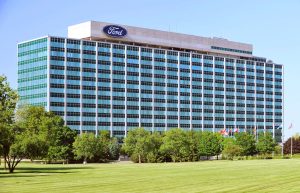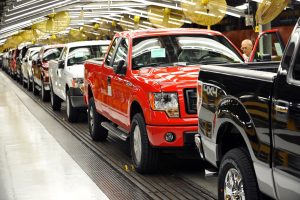Less than a week after federal safety regulators hit Ford with one of the largest fines in automotive history, the National Highway Traffic Safety Administration has launched two new investigations into the way the automaker has handled some recent recalls.
Last Friday, Ford confirmed it will pay a $165 million fine, the second-largest since NHTSA was formed six decades ago. Federal safety regulators determined the automaker failed to follow guidelines, both dragging their feet on several recalls while also failing to keep the agency in the loop, as required by law.
Now, Ford has been targeted by two new investigations examining whether it mishandled other known safety defects. That includes the potential for nearly 460,000 Bronco SUVs and Maverick pickups to unexpectedly lose power, while the second issue involves more than 110,000 Ford Expeditions that could be equipped with faulty seatbelts.
On the plus side, at least for Ford, NHTSA last week closed yet another investigation into a potential engine defect affecting more than 400,000 SUVs and pickups, including the Ford Bronco and F-150 and the Lincoln Aviator.
The latest probes
Ford previously recalled 457,000 vehicles last April due to reports that they could unexpectedly lose power – a problem initially blamed on faulty 12-volt batteries. That service action covered 2021 to 2024 Ford Bronco Sport SUVs as well as Maverick pickups.
But NHTSA has continued receiving complaints from owners who claim they have continued suffered engine power losses after getting their vehicles repaired. The agency will look to see if the recall properly addressed the problems
The second investigation focused on 113,000 Ford Expedition SUVs sold during the 2019 and 2020 model years. A recall was triggered earlier this year by reports of faulty seatbelts that could unexpectedly tighten trap occupants in their seats without a crash.
As with the engine power failure issue some Expedition owners have complained that the problem continues, even on vehicles that have been repaired.
What next
NHTSA will check to make sure that Ford properly identified and then moved to correct the two problems. If not, that could lead to additional recalls, as well as potential fines.
Ford has pledged to cooperate with NHTSA’s investigations.
The automaker knows it is now under the microscope in the wake of last week’s announcement that it will pay a near-record $165 million for mishandling problems with backup cameras on 700,000 SUVs, pickups and vans. (Of that amount, $55 million has been deferred, Ford promising to spend that to enhance its handling of safety issues.
More Ford News
- Ford Paying Near-Record Fine for Mishandled Recall
- Ford Raises “Significant” Safety Concerns Over Fuel Leak
- Ford Shifts EV Plans
Nagging quality and safety issues

The Ford recall that resulted in last week’s fine covered a total of 700,000 vehicles, including 2020 Explorers, across North America.
Ford has struggled to deal with quality and safety problems in recent years. In September it again was forced to recall 144,000 of its Maverick pickups because of issues with their rearview cameras.
September saw another recall covering 91,000 SUVs due to potential engine failures. Last month it recalled a number of Bronco SUVs due to faulty suspension components. There were six recalls involving 200,000 Ford vehicles in August, and 550,000 of its pickups were covered by a service action announced in June.
Recalls can run up substantial costs due to repairs, but Ford has also struggled to deal with costs related to quality snags that don’t necessarily require recalls. And that has been one of the major reasons why Ford earnings fell short of expectations during the most recent quarter. CEO Jim Farley has made quality control a top priority but that has so far failed to bring the issue under control.
Getting a handle on the problem
Of the $165 million in fines levied by NHTSA, $55 million is being deferred, Ford agreeing to invest that in efforts to better control its safety issues.
Among other things, the automaker agreed to bring in an independent outside monitor who will oversee Ford’s response to safety issues over the next three years.
Under the order, an independent third party will oversee the automaker’s recall performance obligations for at least three years, and Ford has to cooperate with the monitor.
“Wide-ranging enhancements are already underway with more to come, including advanced data analytics, a new in-house testing facility, among other capabilities.” Ford said in its statement.













0 Comments